Filter by
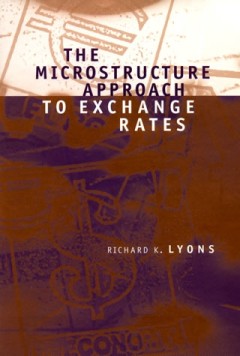
The microstructure approach to exchange rates
"Historically, the fields of exchange-rate economics and microstructure finance have progressed independently of each other. Recent interaction, however, has given rise to a microstructure approach to exchange rates. This book focuses on the economics of financial information and on how microstructure tools help to clarify the types of information most relevant to exchange rates." "The book sho…
- Edition
- -
- ISBN/ISSN
- 9780262622059
- Collation
- -
- Series Title
- -
- Call Number
- -
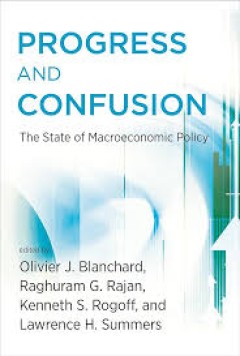
Progress and confusion the state of macroeconomic policy
Leading economists consider the shape and future of economic policy: Will it resume the pre-crisis consensus or contend with the post-crisis "new normal"? Have we made progress with addressing the major issues or does confusion remain in today's economic environment? Chapters address topics that range from the measurement of systemic risk to foreign exchange intervention.OCLC-licensed vendor bi…
- Edition
- -
- ISBN/ISSN
- 9780262333450
- Collation
- 1 online resource (vii, 304 pages) :illustrations
- Series Title
- -
- Call Number
- -
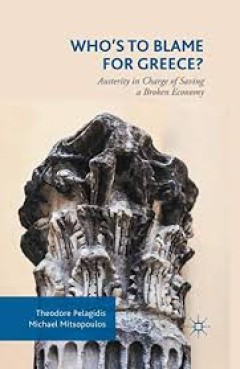
Who’s to Blame for Greece? Austerity in Charge of Saving a Broken Economy
Greece's economy symbolizes in many ways the Eurozone's economic problems and divergent interests as it amasses most of the economic disadvantages characterizing the Eurozone's economy itself. This book presents the economic and political challenges to Greece and the EU member states.
- Edition
- -
- ISBN/ISSN
- 978-1-137-54920-4
- Collation
- -
- Series Title
- -
- Call Number
- -
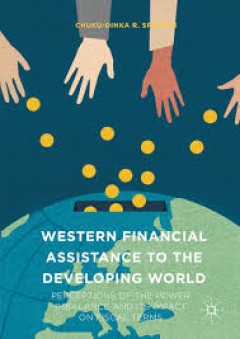
Western Financial Assistance to the Developing World Perceptions of the Powe…
This unconventional book addresses the imbalance of power between countries that give and receive funds for international financial development, with particular attention to the outcomes and impacts of this imbalance on recipient countries. It provides an in-depth analysis of the perceptions that population segments of recipient countries have of the power plays inherent in giving and receiving…
- Edition
- -
- ISBN/ISSN
- 978-1-137-58399-4
- Collation
- -
- Series Title
- -
- Call Number
- -

Karl Brunner and monetarism
"A collection of essays addressing Karl Brunner's contributions to monetarism, and the significance of monetarism to modern macroeconomics"--OCLC-licensed vendor bibliographic record.
- Edition
- -
- ISBN/ISSN
- 0262369672
- Collation
- 1 online resource.
- Series Title
- -
- Call Number
- -

Monetary policy and macroprudential regulation with financial frictions
"A monograph that accounts for financial frictions in some of the most-used macroeconomic models. An attempt to bring practical reality into macroeconomic theory"--OCLC-licensed vendor bibliographic record.
- Edition
- -
- ISBN/ISSN
- 026235943X
- Collation
- 1 online resource.
- Series Title
- -
- Call Number
- -

Macroeconomics
"Macroeconomics is the study of the economic attributes (including the performance, structure, behavior, and decision-making) of whole systems. Macroeconomists study changes in the aggregate, collecting data on unemployment, growth, inflation, income, saving and spending, trade, and other aspects of regional, national, and international economic life. Policymakers depend on macroeconomists' kno…
- Edition
- -
- ISBN/ISSN
- 9780262357913
- Collation
- 1 online resource.
- Series Title
- -
- Call Number
- -

Evolution or revolution :rethinking macroeconomics after the Great recession
Leading economists discuss post--financial crisis policy dilemmas, including the dangers of complacency in a period of relative stability. The Great Depression led to the Keynesian revolution and dramatic shifts in macroeconomic theory and macroeconomic policy. Similarly, the stagflation of the 1970s led to the adoption of the natural rate hypothesis and to a major reassessment of the role of m…
- Edition
- -
- ISBN/ISSN
- 9780262351270
- Collation
- 1 online resource (392 pages).
- Series Title
- -
- Call Number
- -

NBER macroeconomics annual
This 20th edition of the NBER Macroeconomics Annual treats many questions at the cutting edge of macroeconomics that are central to current policy debates. The papers and discussions include an analysis of the differential between American and European unemployment rates, with the authors of the paper taking issue with Edward Prescott's view that higher European tax rates are responsible; a pro…
- Edition
- -
- ISBN/ISSN
- 9780262273732
- Collation
- 1 online resource (xviii, 459 pages) :illustrations, charts.
- Series Title
- -
- Call Number
- -
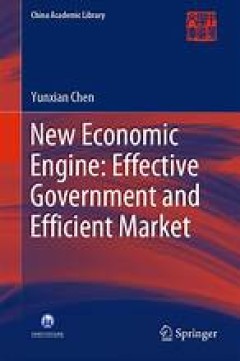
New Economic Engine: Effective Government and Efficient Market
This book contains at least three main highlights: breaking through the limitations of the mainstream Western economics system and the market theory framework, correctly explaining the successful experience of China’s reform and opening up over the past 40 years from an economic perspective, and developing a new economics system and market theory. China’s reform and opening up and innovativ…
- Edition
- 1
- ISBN/ISSN
- 978-981-15-2922-1
- Collation
- Economic
- Series Title
- -
- Call Number
- 338.1
 Computer Science, Information & General Works
Computer Science, Information & General Works  Philosophy & Psychology
Philosophy & Psychology  Religion
Religion  Social Sciences
Social Sciences  Language
Language  Pure Science
Pure Science  Applied Sciences
Applied Sciences  Art & Recreation
Art & Recreation  Literature
Literature  History & Geography
History & Geography